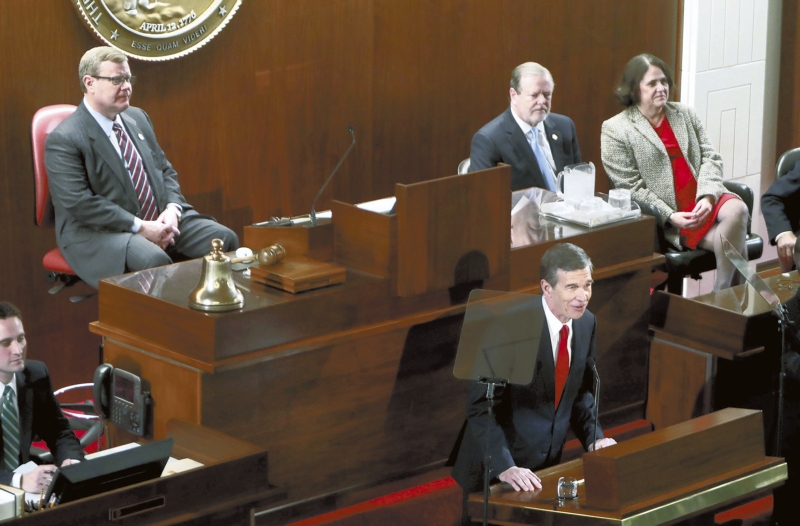Colin Campbell: Legislature shrugs off its #MeToo moment
Published 9:18 pm Monday, July 9, 2018

- North Carolina Gov. Roy Cooper, front right, delivers his first State of the State address to a joint session of the state legislature in the House chamber of the Legislative Building in Raleigh on March 13, 2017. Speaker of the House Tim Moore, top left, and Sen. Phil Berger, president pro tem, second from top right, look on. (Chris Seward/The News & Observer via AP)
RALEIGH — For a moment back in March, it seemed like our state legislature was ready to send a strong message that sexual harassment will not be tolerated.
Several women had accused Rep. Duane Hall, D-Wake, of kissing and touching them without their consent. Hall admitted to one of the allegations and denied others, but rather than apologizing he attacked the media and an ex-girlfriend. His party’s leaders — Rep. Darren Jackson, D-Wake, Gov. Roy Cooper and N.C. Democratic Party Chairman Wayne Goodwin — all reviewed the allegations and called on Hall to resign.
For a moment, it seemed like the Hall scandal would turn out like similar cases in national politics and other statehouses — he’d step down, apologize and other politicians would learn from the incident. Perhaps the situation would prompt reforms in the sexual harassment reporting process, and perhaps other women would be empowered to tell their stories.
After all, previous reports from the NC Insider and WUNC radio had found that sexual harassment at the legislature isn’t limited to a single individual, but few people were willing to confront powerful lawmakers about their behavior.
Democratic primary voters in Hall’s district sent a clear message when only 26 percent of them backed his re-election. But many other House legislators refused to follow the leadership of Jackson, Cooper and Goodwin and instead declined to join the calls for Hall’s resignation.
When surveyed on the issue, only about 15 of the 120 House members said Hall should step down. A few — apparently unwilling to trust that their leaders had vetted the allegations — said the situation required due process. Most Democrats and nearly all Republicans simply remained silent on the issue.
Those seeking due process for the Hall allegation were fully aware that no such process was possible. The legislature doesn’t have a way to investigate anonymous sexual harassment claims, and many of the women involved didn’t want their names to become public. Legislators in both parties agreed that the process needed improvements.
A group of Democrats led by Sen. Erica Smith, D-Northampton, and Rep. Carla Cunningham, D-Mecklenburg, sought to improve the process. They filed legislation in May that would create a new process for reporting, with a human resources staffer and an outside consultant to receive and investigate confidential allegations and make recommendations about sanctions to the Legislative Services Commission and Legislative Ethics Committee. The bill also called for new workplace harassment prevention policies and education.
It would have been a step in the right direction, but it was a step that legislative leaders were unwilling to take. The legislature adjourned without holding a single hearing on the proposal. Lawmakers focused instead on non-existent threats to hunting and fishing rights. The rights of women in the Legislative Building to work without being inappropriately touched or harassed evidently weren’t important enough to get on the short session agenda.
Meanwhile, Hall returned to the legislature after his constituents rejected him. Given the allegations and calls for his resignation, I thought Hall might be a pariah of sorts around the Legislative Building.
Instead, Hall appeared as popular as ever among colleagues. He was often surrounded by people eager to chat with him, and when he gave a farewell speech on the House floor — avoiding mention of the scandal — he got a standing ovation.
Some of the people standing and applauding Hall may have felt it was simply the polite thing to do. But imagine if you were a legislative staffer or lobbyist thinking about going public with allegations of another lawmaker’s sexual misconduct.
You might hear a message in that applause: Sit down. Shut up. Coming forward with accusations won’t change a thing.
While politicians in other places did the right thing when confronted with sexual harassment allegations, North Carolina’s #MeToo moment was just that: A moment, and nothing more.
Colin Campbell is editor of the Insider State Government News Service.

